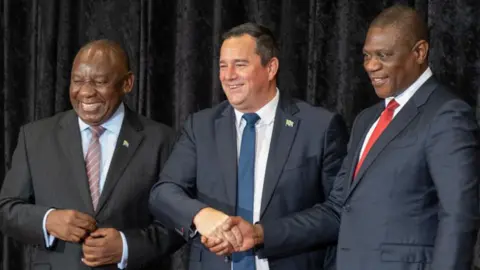S Africa president fires stinging rebuke at coalition partner
 AFP via Getty Images
AFP via Getty ImagesSouth African President Cyril Ramaphosa says he will "not yield to threats and ultimatums" in a stinging rebuke to the second biggest party in his coalition government.
Ramaphosa drew the Democratic Alliance's (DA) ire after he removed Deputy Trade Minister Andrew Whitfield over an unsanctioned trip abroad earlier this year.
Whitfield, a member of the DA, was part of a delegation that travelled to the US back in February after Washington's relations with South Africa soured.
The DA has since given Ramaphosa until Saturday afternoon to remove other errant ministers and deputies in his executive from other parties as well or "all bets are off".
This latest DA demand is one of a series of rows within the Government of National Unity that have threatened its survival, but the junior partner has yet to pull the plug on its involvement in the coalition.
Ramaphosa, in a lengthy statement issued on Friday, said he had removed Whitfield in accordance with the constitution.
He added that while it was "not common practice" for him to provide reasons for the appointment or removal of members of his executive, "due to several unfortunate statements and outright distortions by a number of people", he saw it fit to publicly comment.
- Is South Africa's coalition government about to fall apart?
- South Africa in 'uncharted waters' as budget splits coalition government
"Mr Whitfield was removed as a deputy minister because he undertook an international visit without the permission of the president. His travel to the US was a clear violation of the rules and established practices governing the conduct of members of the executive," Ramaphosa said.
According to these rules, any international travel undertaken by ministers or deputies "must always be undertaken with the express permission of the president".
Ramaphosa confirmed that he alerted DA leader John Steenhuisen prior to Whitfield's removal and asked him to submit a replacement name "as the DA is entitled to a deputy minister [position] as agreed".
The president also cited previous instances where deputy ministers were removed for similar reasons, including late former President Nelson Mandela's removal of his ex-wife Winnie Madikizela-Mandela as deputy president in 1995.
Based on this, Ramaphosa said there was no "basis for suggestions that the dismissal of the former deputy minister is related to any other reason than his failure to receive permission to travel".
"Let it be clear that the president shall not yield to threats and ultimatums, especially coming from members of the executive that he has the prerogative to appoint in accordance with the Constitution of the Republic of South Africa," he added.
The DA, in an ultimatum issued to Ramaphosa after Whitfield's removal, accused the president of a "flagrant double standard" and warned him that should his party, the African National Congress (ANC) "fail to meet our ultimatum, all bets are off and the consequences will be theirs to bear".
Whitfield also broke his silence on the issue in an interview with South African public broadcaster SABC on Thursday evening.
He said no reason or "formal explanation" for his axing was given in the letter he received.
He acknowledged that his trip to the US, taken at the behest of his party, was not approved by the president, despite the fact that he submitted his request two weeks prior to his departure.
"I simply took silence as consent and perhaps that was an error in judgment on my part," he conceded.
He echoed Steenhuisen's remarks that there may be another motive behind his firing, labelling it "premature and an unnecessary provocation".
"I just don't see a situation in which the DA can continue to operate in the GNU in the way we have. There are a number of options at our disposal [and] leaving the GNU is one of them," he told the SABC.
The DA is one of the 10 parties that formed the GNU, led by Ramaphosa's African National Congress (ANC), after no party emerged as the clear winner in the 2024 general election.
Relations between the two biggest partners have been strained since the government was formed as the duo disagreed over several key issues. Tensions reached a boiling point earlier this year when the DA refused to support a crucial vote on the national budget in parliament.
The ANC then accused the DA of "complete betrayal" by breaking ranks with its partners in the GNU.
More BBC stories on South Africa:
 Getty Images/BBC
Getty Images/BBCGo to BBCAfrica.com for more news from the African continent.
Follow us on Twitter @BBCAfrica, on Facebook at BBC Africa or on Instagram at bbcafrica
